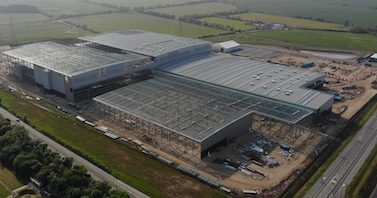The Leeds-based UK Infrastructure Bank has announced a £200 million loan to support the development of AESC’s gigafactory in the North East of England.
The bank said this will help to strengthen the UK’s electric vehicle supply chain and provide a boost to the regional economy.
“The bridging loan will support the construction of the 15.8GWh gigafactory in Sunderland, which started in 2022,” said the bank.
“The project will create and support more than 1,000 jobs once operational.
“The factory will produce lithium-ion batteries for next-generation electric vehicles manufactured in the UK.
“Domestic battery manufacture is seen as crucial to the success of future UK car production and key for the transition to net zero, with around 200GWh needed by 2040 to meet demand from car manufacturers, according to recent forecasts.
“The project supports the Government’s recently published Battery Strategy and aligns strongly with the UK Infrastructure Bank’s core mission to tackle climate change and support local and regional economic growth, and its mandate to invest in critical supply chains and advanced manufacturing which supports the UK’s net zero transition.”
The site will be AESC’s second plant in Sunderland, with the existing 1.8GWh facility built in 2012 currently the UK’s only operational gigafactory.
Incorporated and headquartered in Japan, AESC is a developer and manufacturer of high-performance batteries for electric vehicles and energy storage systems and has a production footprint with major facilities in the UK, France, Spain, US, China, and Japan.
UKIB’s financing is focused on supporting the facility in Sunderland.
UK Infrastructure Bank CEO John Flint said: “A domestic battery supply chain will play an important role in the UK’s transition to net zero and also the wider economy, as highlighted in the Government’s recently published Battery Strategy.
“Gigafactories are an essential part of that supply chain. They also have the potential to secure and create thousands of jobs, but serious investment is needed to scale up production.
“This loan signals the bank’s appetite to play a meaningful role in the financing of the domestic battery supply chain and that we are ready and willing to deploy capital where it is needed for this crucial Net Zero infrastructure.”
The UK Infrastructure Bank was formed in 2021 with the twin objectives of helping to tackle climate change and supporting regional and local economic growth.
Based in Leeds, the bank partners with the private sector and local government to help solve financial problems linked to these two objectives, while working to unlock private investment.
It is wholly owned and backed by the UK Treasury but is operationally independent.
